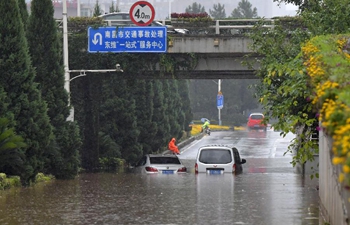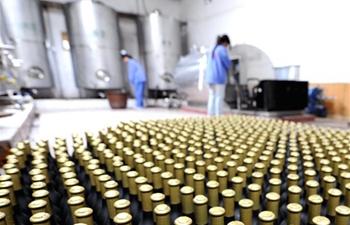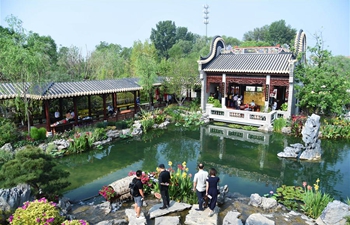by Nick Kolyohin
JERUSALEM, July 14 (Xinhua) -- An Israeli official with the Agriculture Ministry has confirmed to Xinhua that a governmental initiative to digitalize and innovate its crops market would become operative by the middle of 2020.
Tsipi Sabag Freidkin, head of the market research division at the Agriculture Ministry, said in an interview with Xinhua that under the new initiative, the crop market would work similarly to an auction.
"The digital market would help the small businesses like restaurants and grocery stores to get more fresh, healthy and cheaper produce directly from the farmers, skipping the middlemen," said Freidkin.
Freidkin estimates that the digital marketplace would kick start in 2020 and by 2021 would become fully operational throughout the country.
The initiative is sponsored by the Agriculture Ministry, the Finance Ministry, and the Israel Innovation Authority.
The complex logistics of the technologies that would support the trading floors is yet to be decided by the ministries.
The Israeli government issued tenders that call farmers, entrepreneurs, logistic experts, and start-ups companies to bring up the best solutions for a new computerized, complicated system of trade and distribution.
The government hopes that electronic trading in fresh vegetables and fruits would bring the Israeli agriculture marketplace to a new era of advanced technologies and deal with current problems at the market.
These problems include a highly regulated market controlled by tight governmental grip, according to some experts.
The Organization for Economic Co-operation and Development (OECD), a body of 36 nations of developed or emerging economies, has recently issued a report about the Israeli agriculture market.
The report, titled "Agricultural Policy Monitoring and Evaluation 2019," claims that while Israel strives to evolve its agriculture sector by developing cutting edge technologies, the government has almost absolute control over the agriculture sector.
The Israeli agriculture has introduced numerous innovations, such as drones, digital screening, robotics, and smart sensors. However, the industry depends on government-allocated water and land quotas, and the amount of allowed production is also usually regulated.
The government also controls the industry by implementating tariffs, customs, and sometimes bans imports of some crops from overseas.
The forthcoming platform is aimed to reduce the marketing margins by creating transparency in pricing and consolidating the link between quality and price.
The sophisticated, advanced trading methods would empower small business and give them as to the farmers the opportunity to be fully aware of the whole process the crops and money do from the field to their final destination.
Starting next year, the space between the retailer and the farmer will be reduced. Costs along the entire supply chain will be cut, said Freidkin.
"The government will drive the process, lay down the infrastructure, define its characteristics and help with the financing," she said.
Government representatives expect that there would be fairer trading conditions for those farmers whose bargaining power so far has been weak.
Meanwhile the farmers are pretty clueless about which crops would be in shortage or surplus at the coming seasons. Consequentially, some farmers grow crops which at last would not be in demand.
The transparency of the digital market would enable more reliable statistics and prediction on the market tendencies which would enable to find a better fit between demand and supply.
Government ministries would use the availability of real-time data on domestic trading for research and development purposes in the market they grip so tight.
Nowadays, the trading methods in fruit and vegetables are outdated, inefficient and harmful to the quality of the produce arriving at the consumer's table, according to the Ministry of Agriculture.
Today there is one wholesale market who serves all the country, it has poor store conditions that are damaging the crops and make them less healthy or fresh.
Moreover, the multiplicity of links in the supply chain, the lack of a quality standard, failure to observe the refrigeration chain and other factors, make the current situation unbearable.
The outmoded system practiced at present inflicts not only financial damage but also social and ecological damage, the government acknowledged.
The fruits and vegetables still change several hands before they complete their journey from the field to the consumer. This makes them more expensive and also diminishes freshness and quality.
It took Israel many years before the high-tech nation has found a better solution for the agriculture market in the form of the coming digital market space.
Israel should continue and intensify its ongoing efforts to diminish the regulatory burden and improve the transparency and competition in the Agrofood chain, says the report.
Progress made in these areas would not only reduce trade costs and encourage trade flows but would also diminish costs for the processing industry and prices for the final consumers of Agrofood products, according to the report.
Eran Shavit, director of economic cooperation with OECD at Israeli Ministry of Agriculture stressed, "the world market in agriculture goods became in the 21st century a much harder place for the Israeli products."
"The OECD reports are saying more or less the same for the last 10 years, we (Israel) made an effort but we still have a long way to go," Shavit said in an interview with Xinhua.
During the years 2016 to 2018, the agricultural policies of the 53 countries covered in the OECD report provided a total of 705 billion U.S. dollars per year to their agricultural sectors.
About three-quarters of this support, 528 billion U.S. dollars per year, was transferred to individual producers.
At the same time, six countries, in particular, Argentina and India, taxed their agricultural producers using measures that depressed the domestic price of some commodities, the report stated.
Governments need to roll back distortive, inefficient and environmentally harmful support and put emphasis on high-return policy interventions and the enabling environment for a productive, sustainable and resilient agri-food sector, the report stated.
Climate change and weather-related production shocks are expected to increase the challenge of improving productivity, sustainability, and resilience on farms, the report warns.
Israel has world-leading cutting-edge technologies in the agriculture sector, now the challenge is to use the technology for a modern system of market, delivery and keep healthy crops from the field to the customers.

















